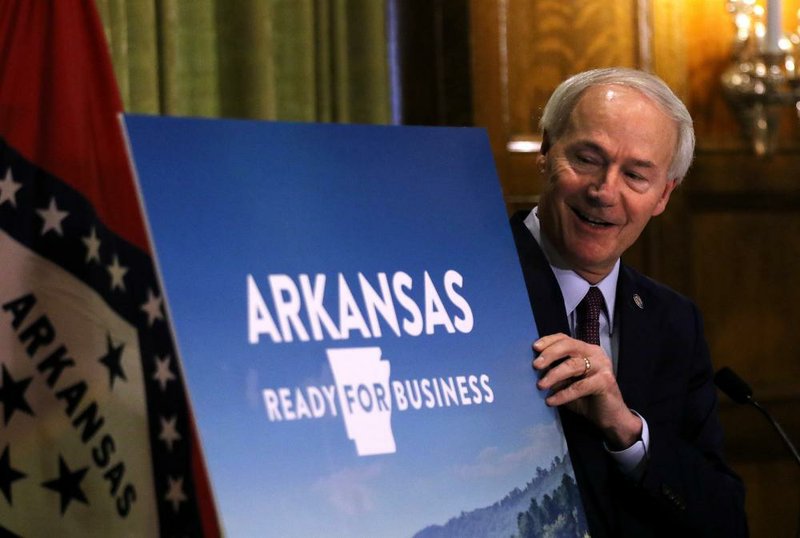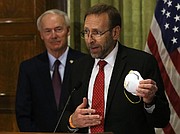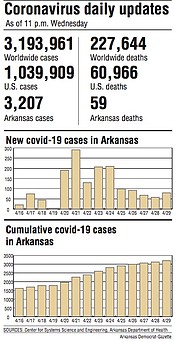Arkansas restaurants will be allowed to open for dine-in service May 11 as long as they take precautions such as requiring employees and customers to wear masks, limiting their seating and spacing tables 10 feet apart, Gov. Asa Hutchinson said Wednesday.
At his daily news conference on the coronavirus, Hutchinson also announced a plan to use $15 million in federal coronavirus relief funds to provide grants of up to $100,000 each to help businesses with expenses such as buying protective equipment and reconfiguring their operations to meet public health guidelines.
He held up a sign with a slogan for the state's gradual reopening: "Arkansas ready for business."
"This is a great opportunity for us to reengage, to rehire and start getting back to business in a phased and cautious approach," he said.
[CORONAVIRUS: Click here for our complete coverage » arkansasonline.com/coronavirus]
Later Wednesday, an advisory panel of Cabinet secretaries and legislators recommended that Hutchinson start the grant program, as well as the allocation of $70 million for other programs, including assistance to nursing homes, physicians and other health care providers and a "public education campaign" to "rebuild consumer and employer confidence."
"We can lift restrictions, we can open restaurants, we can allow churches to meet, but the public is just not going to participate in that and engage the economy unless they feel like it's safe to do so," Department of Parks, Heritage and Tourism Secretary Stacy Hurst said as she presented the proposal for the campaign to the panel.
DATE 'SOLID'
The announcements came as the state's death toll from the coronavirus rose by two, to 59.
From Tuesday evening to Wednesday evening, the number of cases in the state's official tally, which doesn't yet include all of the results from an outbreak at the Cummins Unit in Lincoln County, rose by 80, to 3,207.
[Video not showing up above? Click here to watch » https://www.youtube.com/watch?v=vet_NG1cUcI]
All 81 cases identified from Tuesday afternoon to Wednesday afternoon -- the time of the governor's news conference -- were from outside the prison, state Health Secretary Nate Smith said.
That marked the second-straight day in which the number of newly identified non-inmate cases in the state rose.
The state reported 60 new non-inmate cases on Monday and 74 on Tuesday.
"That's obviously a concern any time you see cases that go up," Hutchinson said.
[Gallery not loading above? Click here for more photos » arkansasonline.com/430gov/]
But while he said he would be monitoring the virus's spread, he indicated the May 11 date for restaurants to reopen their dining rooms is unlikely to change.
"I expect that when you set a date for May 11 that businesses count on, they're investing in that date, you don't move it unless you have absolutely no other recourse," Hutchinson said. "So we'll watch it, but we expect that date to be solid."
But he added that he could simply wait longer to relax restrictions further if growth in new cases doesn't slow.
"That's the kind of discipline that we'd probably exercise, would be not simply going on the second phase," he said.
MASKS REQUIRED
According to the new rules on restaurants, customers for dine-in service will be required to wear masks covering their noses and mouths upon entering the businesses and until their food or drinks are served.
Masks will also be required for staff members who come into contact with customers and encouraged for those who work in the kitchen.
People will be able to eat together at tables in groups of no more than 10 people, and restaurants will be required to limit seating to 33% of their capacity.
Tables will be required to be at least 10 feet apart, so that the seats at each table are at least 6 feet from seats at other tables.
Reservations should be encouraged "when practical," and physical distancing should be maintained when customers are waiting to be seated, according to the directive.
Customers should be encouraged to order ahead of time "to reduce time spent in the facility," it states.
Staffs will be required to be screened each day for cough, sore throat, fever and shortness of breath. Those with symptoms "shall be immediately excluded from the facility," according to the directive.
Signs will also have to be posted at the entrance barring customers from entering if they have had such symptoms.
Staff members will required to wear gloves that must be "changed out between each customer, customer group, or task."
Restaurants will also be encouraged to have a "senior hour to provide exclusive access to these high risk individuals."
Customers won't be allowed to order from the bar.
Buffets, salad bars and other self-service options will be prohibited. Restaurants also won't be allowed to provide live music or other entertainment.
Bars that aren't part of restaurants will remain closed under the state's first phase of the relaxed restrictions.
New Health Department directives that relax restrictions further will come after "the Secretary of Health determines epidemiological data are sufficient."
In the second phase, restaurants will be able to increase their seating to 66% of their capacity, and bars and entertainment options will open with a requirement for customers to maintain 6 feet of separation.
Phase 3 "will include returning to normal operations with full seating capacity."
REACTIONS IN STATE
City officials around the state voiced support for the announcement, but reaction from the restaurant industry was mixed.
To slow the spread of the coronavirus, restaurants in the state have been limited to take-out, delivery and drive-thru service since March 20.
Some Little Rock restaurant owners said it was still too early to safely serve dine-in customers and that they planned to stick with offering carry-out or delivery only.
Hutchinson said the Health Department directive won't change emergency rules allowing restaurants with wine and beer permits to sell and deliver unopened containers of wine and beer with food for off-premises consumption.
Little Rock Mayor Frank Scott Jr. said the governor took a lot of time to listen to feedback from Little Rock about a restaurant reopening date.
Scott said he conveyed a wide variety of opinions from 30 to 40 restaurateurs representing a diverse cross-section of eateries.
Scott said he speaks with Hutchinson daily and will continue to reevaluate opening dates, taking into account data and testing rates.
"We're working as best as possible to have a collaboration with the state on how we respond and focus on protecting lives in Little Rock," Scott said. "He has to make a statewide policy, so we're going to do what's best to follow that policy."
The Little Rock mayor said he will likely scale back the city's 9 p.m. curfew to be helpful to restaurants, but he does not plan to eliminate it completely.
The mayor said he is concerned about a second wave of the virus but hopes to ramp up testing, especially in black and Hispanic communities that lack sufficient access.
North Little Rock Mayor Joe Smith said that if state health officials are comfortable with allowing limited dine-in operations, then he is all for it.
"We have around 200 restaurants in North Little Rock, and I would say about half of them have switched over to carry-out and curbside service," Smith said. "They are struggling, no doubt. If they can do 33% occupancy safely and they can afford to do it, then I see this as a great option."
Texarkana City Manager Kenneth Haskin said the governor's announcement was welcome news and that restaurant owners he's spoken with are relatively comfortable with reopening.
"This is not a precipitous reopening. This is a gradual approach," he said. "I'd say it's a much more reasonable approach to reopening than just throwing on a light switch, and our businesses understand that."
[Interactive Arkansas map not showing up above? Click here to see it: arkansasonline.com/arvirus]
Jonesboro Mayor Harold Perrin said he also trusts Hutchinson's plan.
"Everyone from the governor to mayors to business owners are learning as they go right now," Perrin said in an email. "I believe strongly in each step our governor has taken thus far, and I am eager to see Jonesboro's economy back on its legs."
Haskin pointed out there is no certainty that customers will embrace dining out the way they did before the pandemic. After more than six weeks of hunkering down under the threat of the coronavirus, it might require more time for consumers to become comfortable again with returning to restaurants.
"That's where we're going to see if the consumers are ready to come out, but we believe the approach is reasonable," he said. "It makes sense, and we're certainly going to embrace it and see how things shake out."
Fort Smith City Administrator Carl Geffken said he supports the decisions Hutchinson has made.
"They were based on what Arkansas was facing with covid-19, and as we move forward to open our shuttered businesses, I know the governor is relying on his medical experts to determine the best course of action," Geffken said.
Arkansas Hospitality Association chief executive Montine McNulty, a member of a task force appointed by Hutchinson that helped craft the new regulations, said she would have preferred the starting occupancy for restaurants to be higher than 33%, a level at which profitability for many restaurants will be difficult.
But she said she's hopeful the state can quickly progress to the next phase, in which more customers will be allowed.
"I think that for the most part, [restaurants are] anxious to get back into business," McNulty said. "There's a lot of preparation that takes place before they can even open their doors, so I think it's reasonable, the date that [Hutchinson] set."
LATEST DEATHS
A state website indicated the virus had claimed its first life in Sevier County.
Jefferson County's death toll rose by one, to 14.
Smith said Montgomery County had reported its first case, leaving Little River and Calhoun counties as the only ones in the state where a resident has not tested positive.
Identified infections among nursing home residents in the state increased by 11, to 241, including 19 residents who have died, and among staff members at the homes by 13, to 128.
No new cases were reported at the Cummins Unit, where 860 inmates and 51 staff members have tested positive.
Smith said one of the inmates is hospitalized in the field hospital at the unit, three are at UAMS Medical Center in Little Rock, and seven are at Jefferson Regional Medical Center in Pine Bluff. Three of the hospitalized inmates are on ventilators, he said.
Statewide, the number of hospitalized covid-19 patients fell by 11, to 93, and the number on ventilators fell by two, to 18.
GRANTS FOR BUSINESSES
The grant program, which Hutchinson said will require the approval of members of the Legislative Council, would provide grants of $1,000 per employee to businesses for expenses from March 1-Dec. 31 associated with ensuring the health of their employees and customers and allowing the businesses to resume normal operations.
The maximum grant amount would be $100,000.
Eligible expenses include personal protective equipment, cleaning, hand sanitizer stations, signs and the reconfiguration of operations to meet health guidelines.
Half of the funding would be designated for businesses with fewer than 50 employees. Applications would be reviewed in the order they are received, according to a summary of the proposal.
Money for the grants would come from the $1.25 billion Arkansas was allocated under the Coronavirus Aid, Relief, and Economic Security Act passed by Congress last month.
Meeting by web conference, the state CARES Act Steering Committee also recommended spending up to $700,000 on the marketing campaign by Little Rock firm CJRW.
According to the firm's proposal, the campaign would run from May through July and include a website, television commercials, online advertising, email marketing and public relations.
The proposal was presented by Hurst on behalf of the economic recovery task force appointed by Hutchinson to make recommendations on how to relax restrictions imposed to slow the spread of the coronavirus.
"One of the first challenges that we recognized as a committee, as a task force, is that consumers won't reenter the marketplace until they have a level of confidence that they can do so safely," Hurst said.
She said the campaign will "be both consumer-driven and business-driven and really focus on providing the narrative that the decisions are driven by science and it is safe to return to the marketplace."
The steering committee also recommended approval of a proposal by the state Department of Human Services to spend $45 million to reimburse nursing homes for their expenses associated with the pandemic and $23 million for other providers including independent physicians, ambulance services, mental health agencies and providers who serve the developmentally disabled.
The department would also spend up to $1.2 million to provide an extra payment of $500 to foster parents.
Human Services Department Secretary Cindy Gillespie said the nursing home assistance is similar to what the department had hoped to provide using Medicaid funds, but it hasn't received federal approval for that proposal.
If the Medicaid proposal is approved or other federal funding becomes available for any of the department's proposals, then the department would use that funding source and return the CARES Act funding, she said.
Information for this article was contributed by Stephen Simpson, Rachel Herzog, Dale Ellis and Thomas Saccente of the Arkansas Democrat-Gazette.
A Section on 04/30/2020


